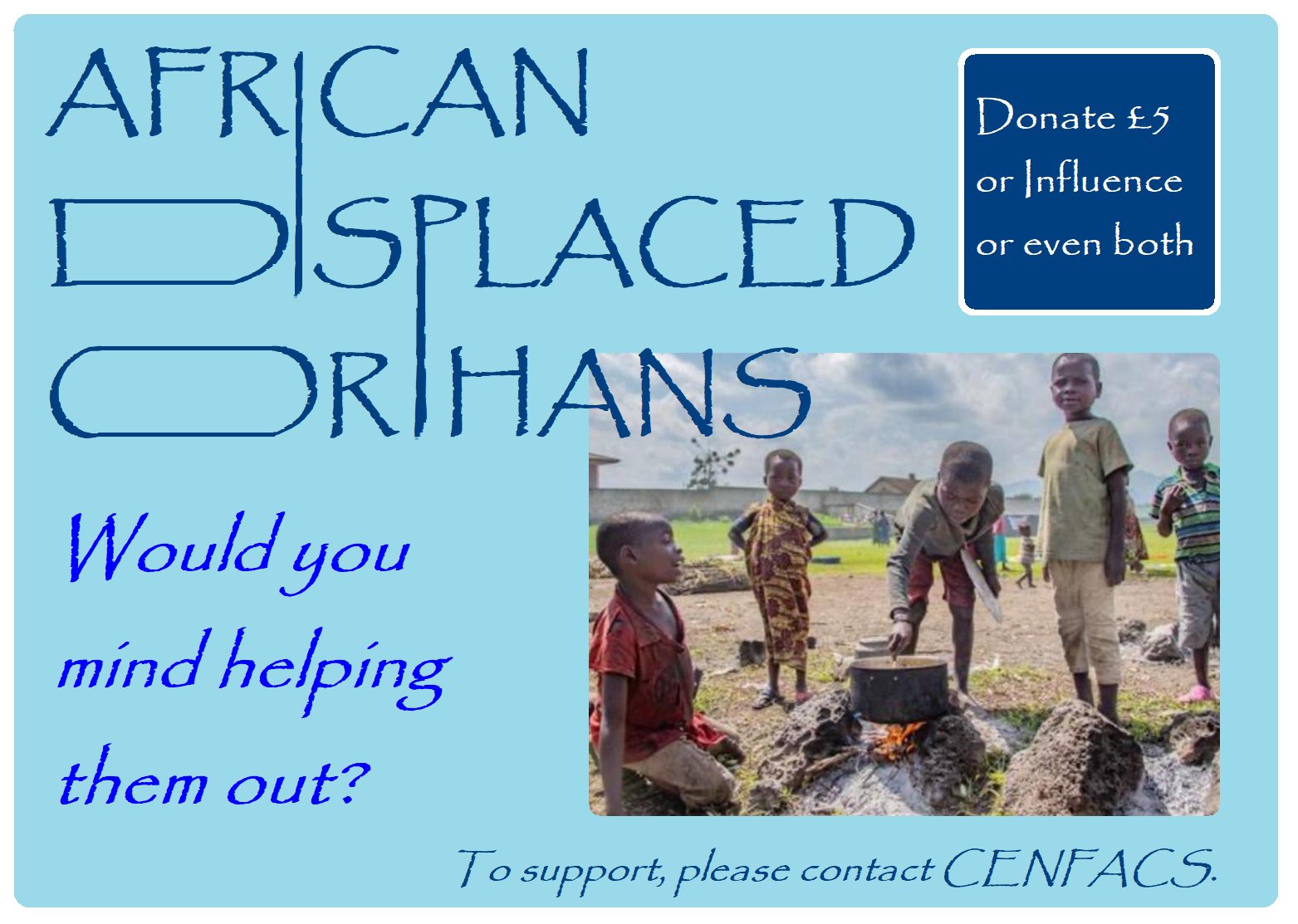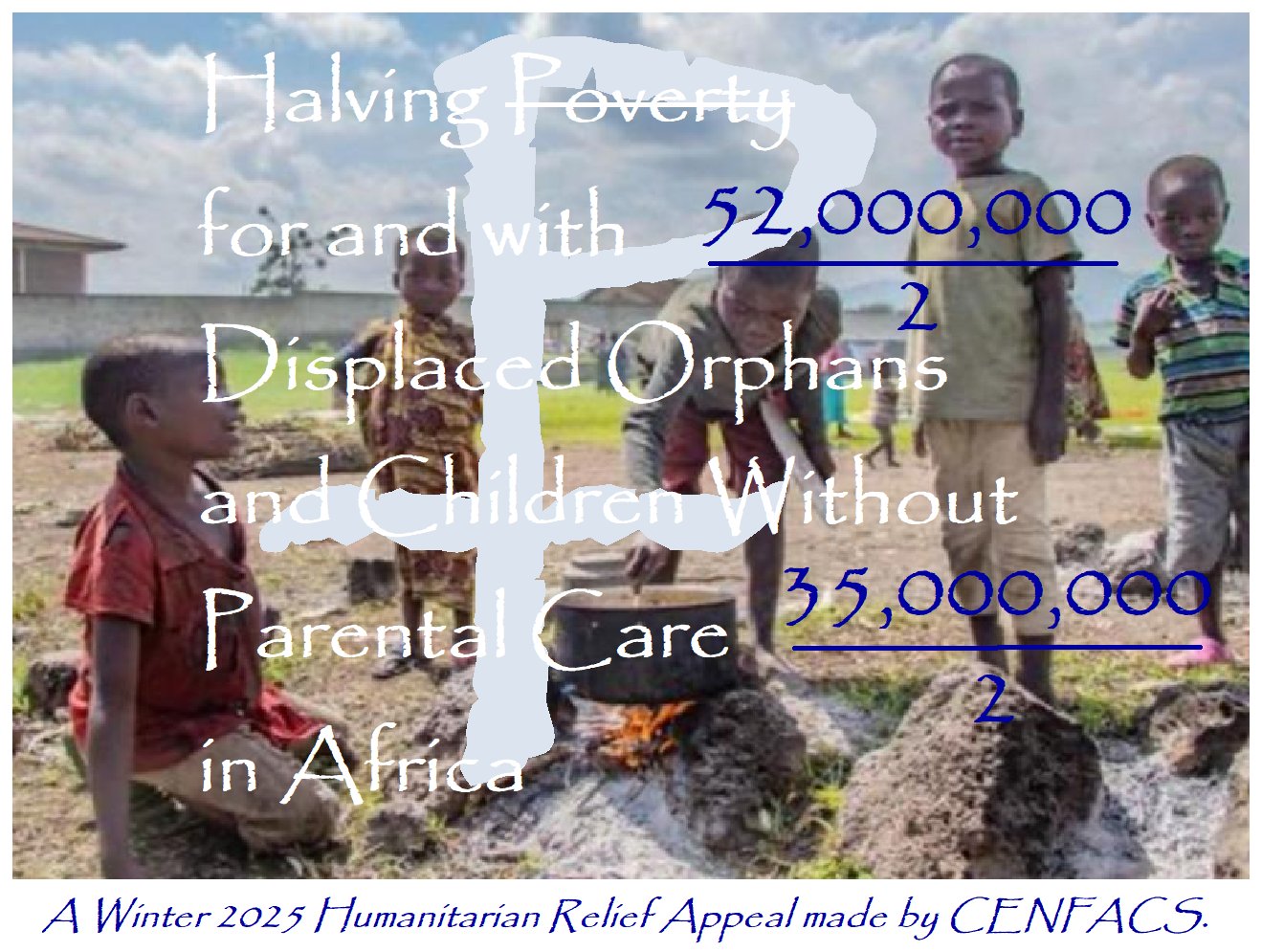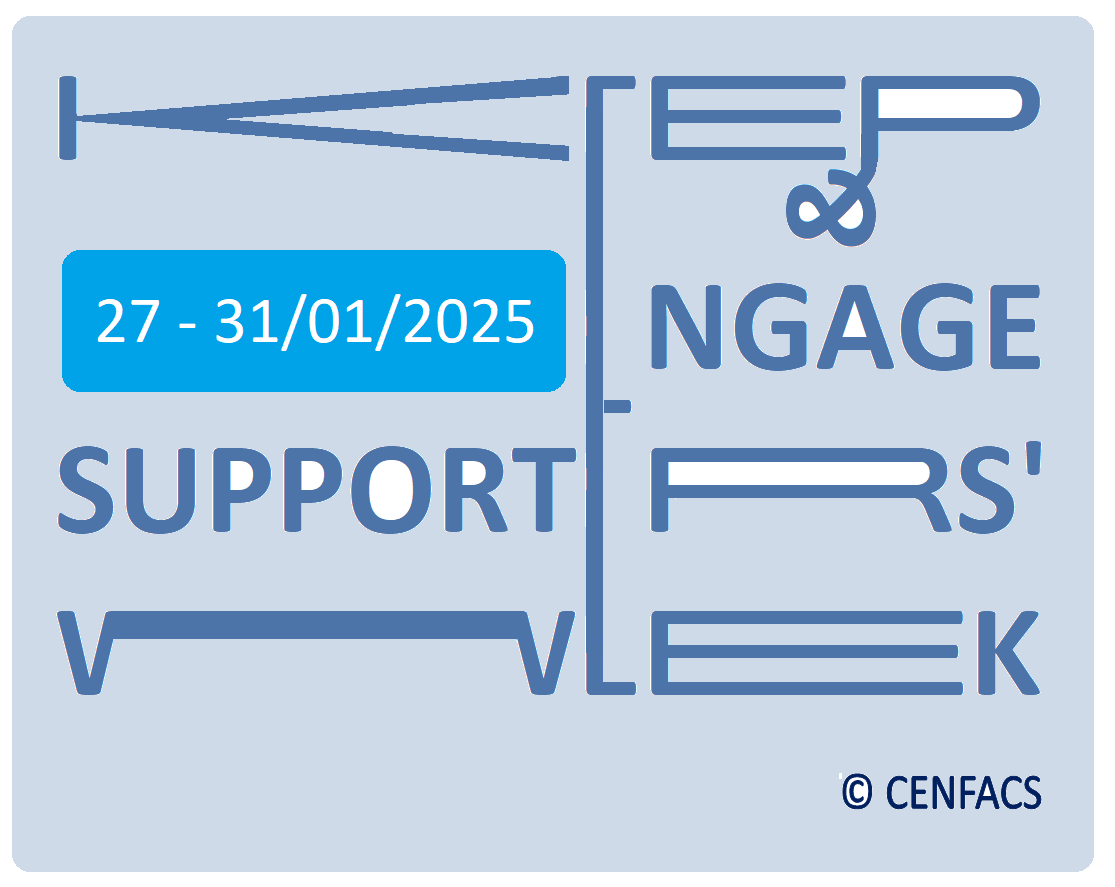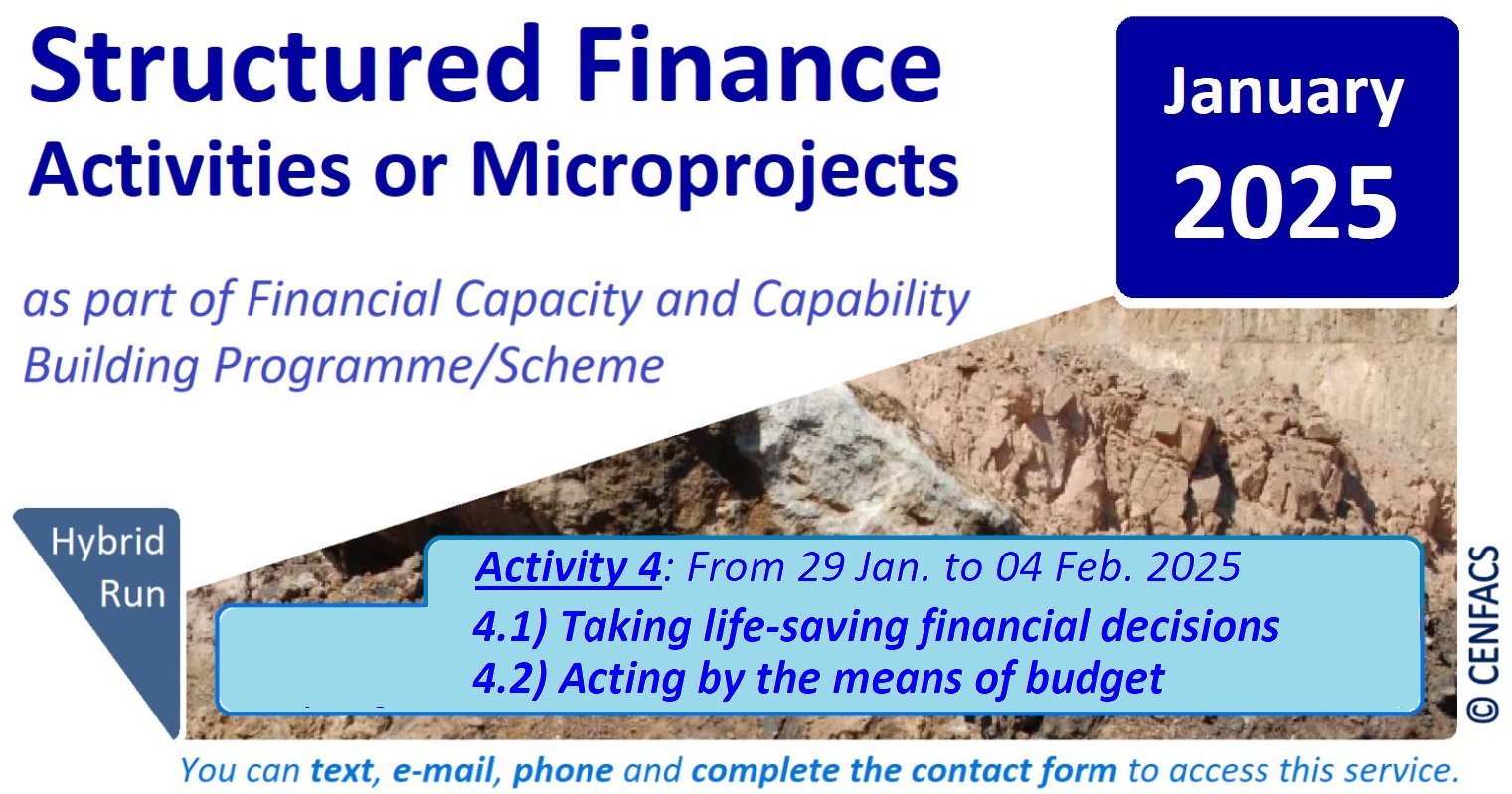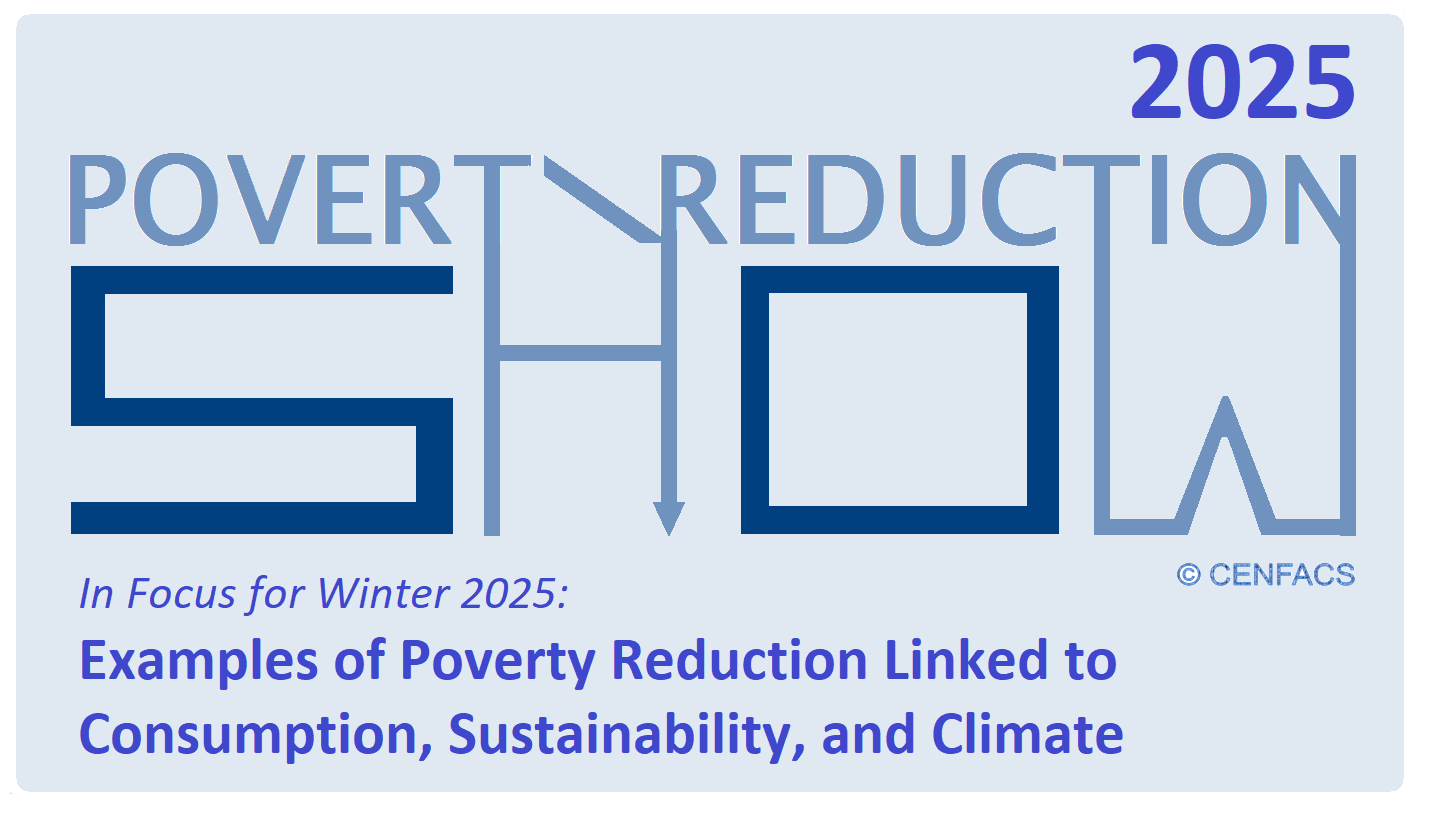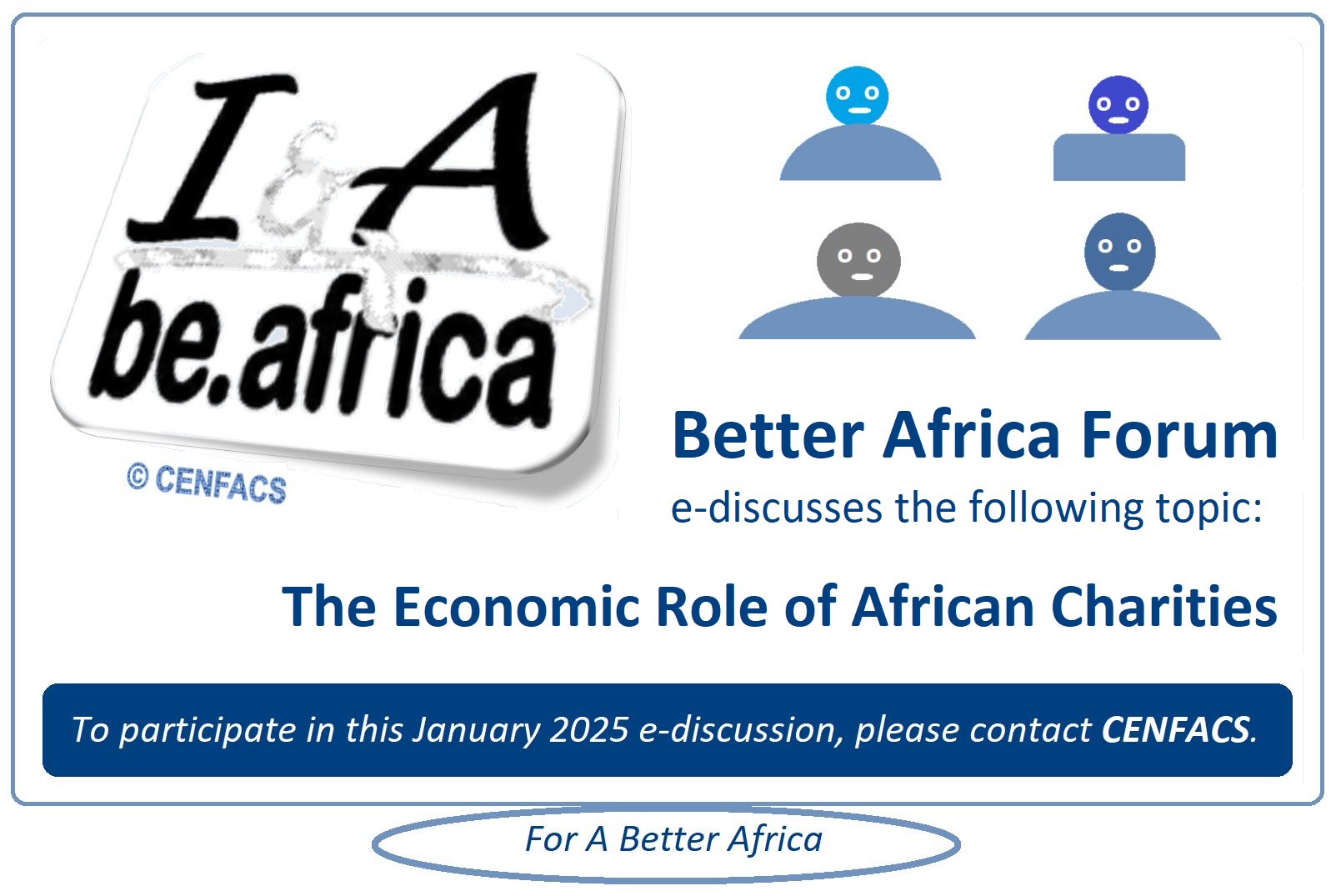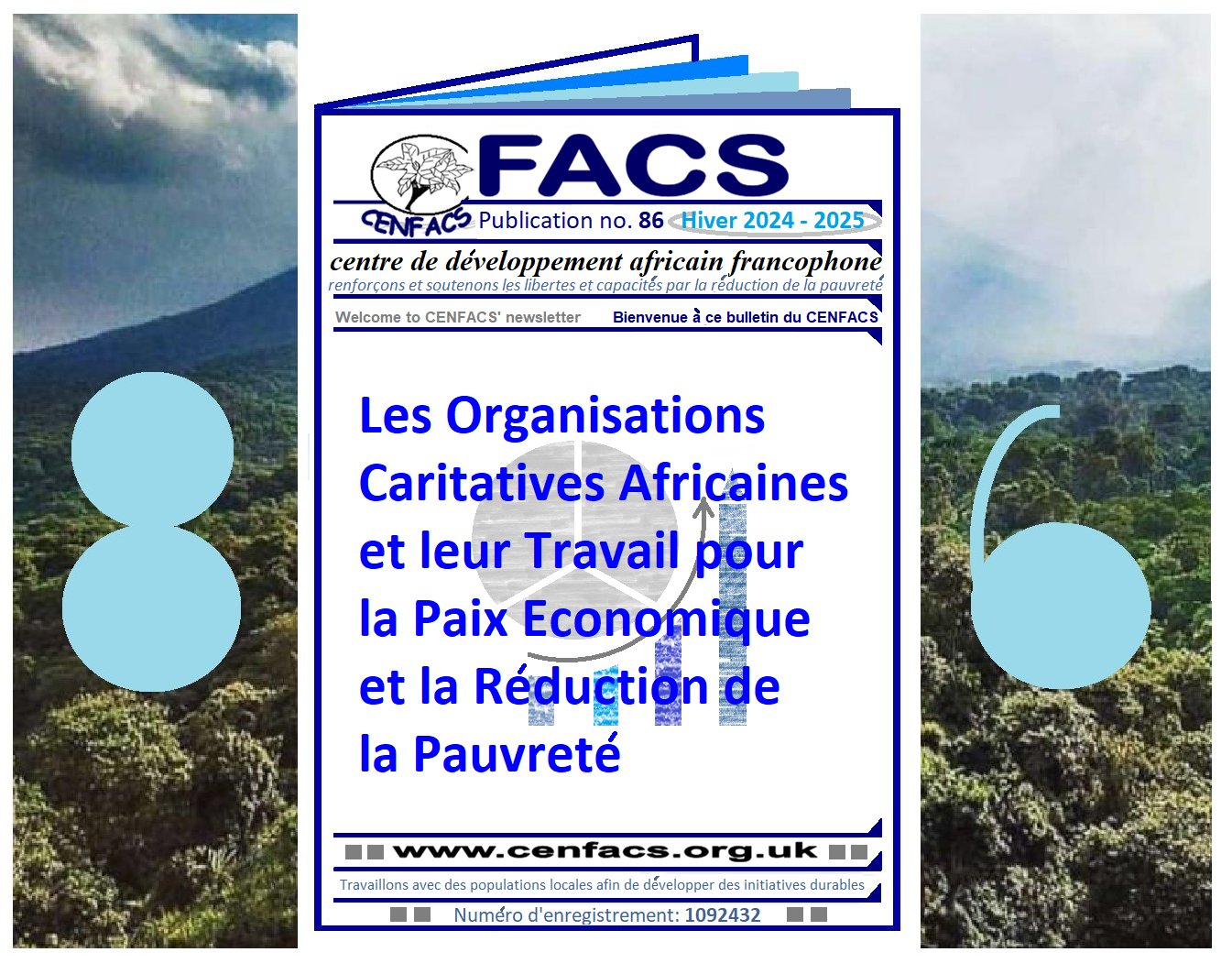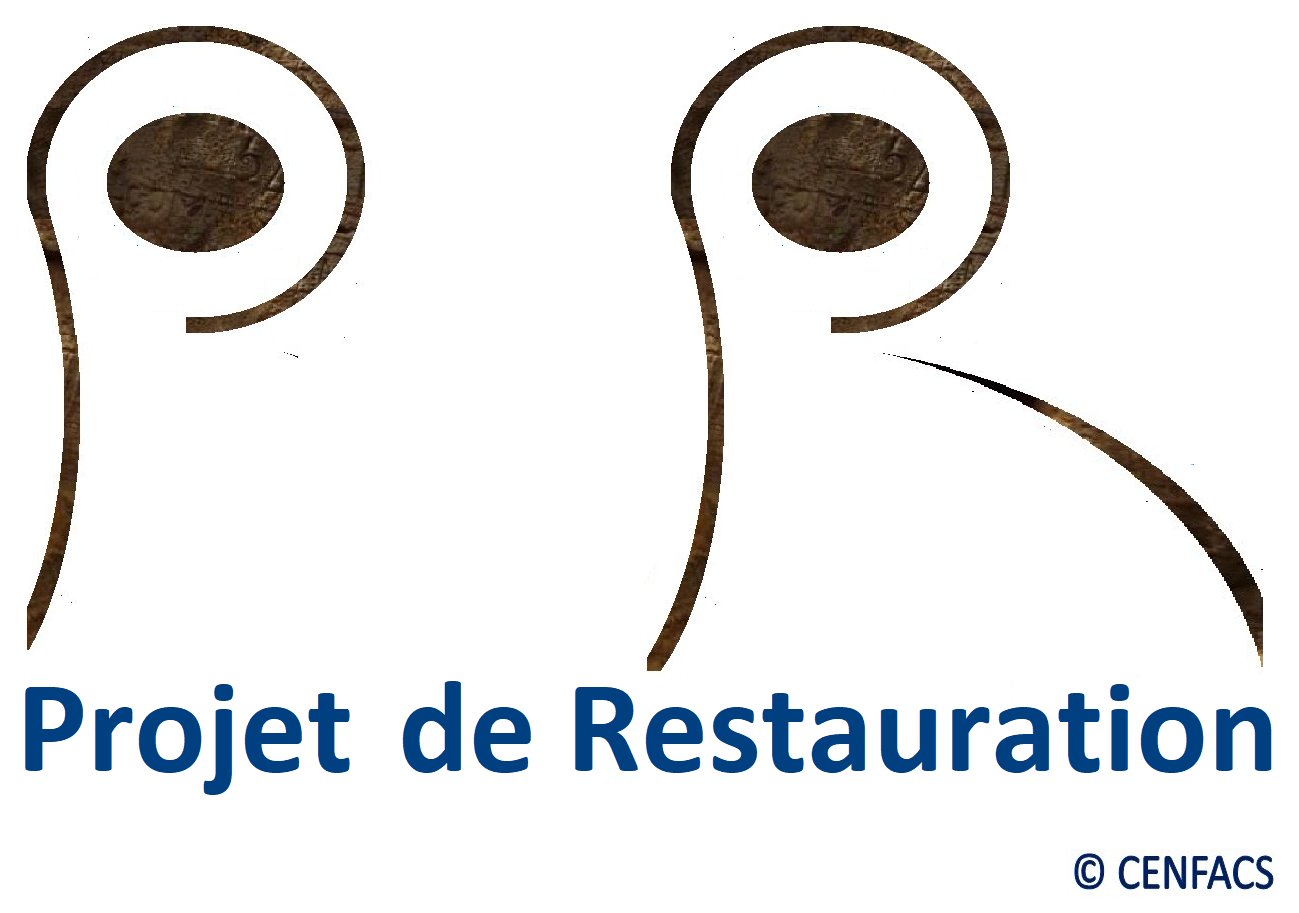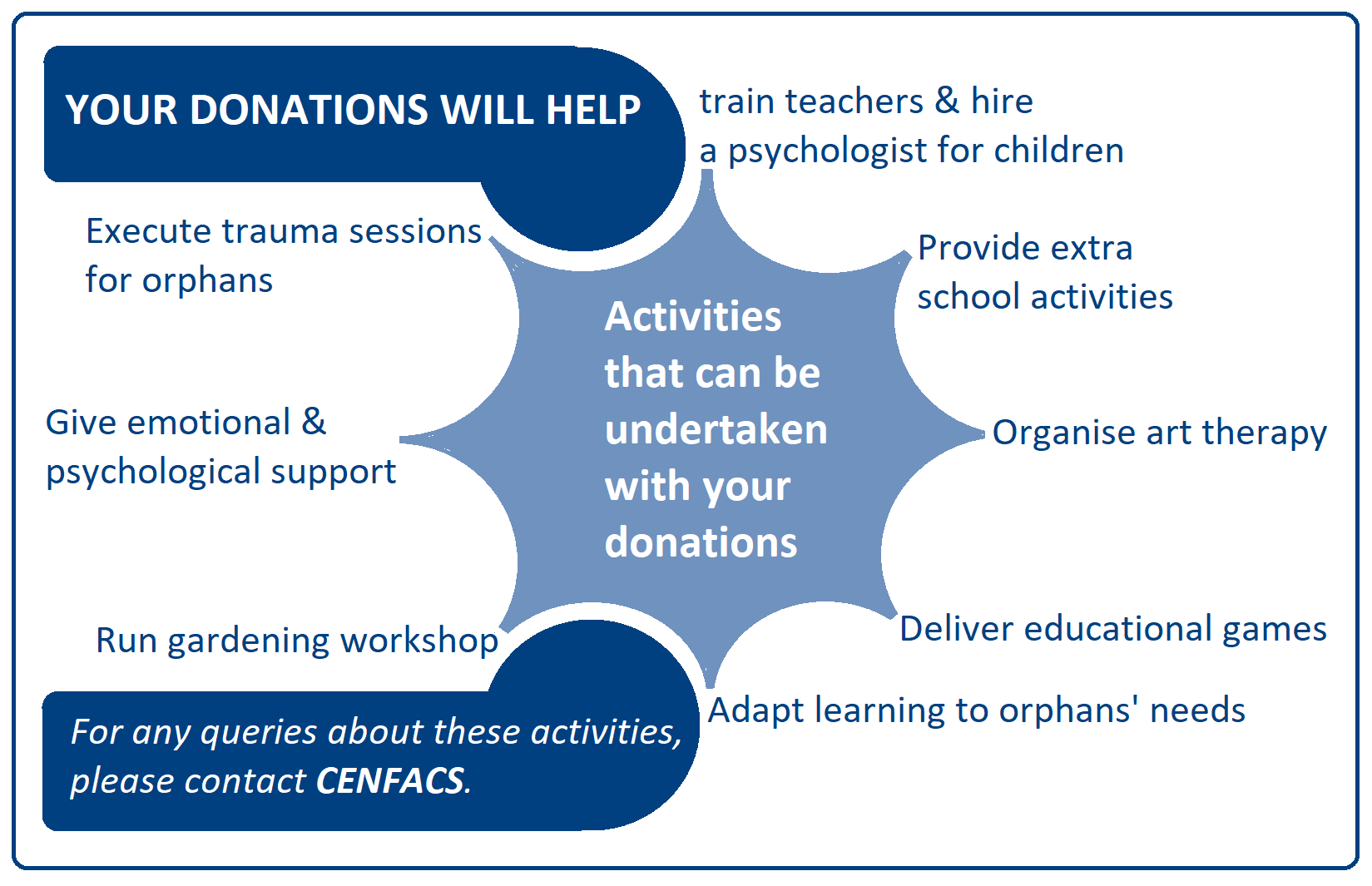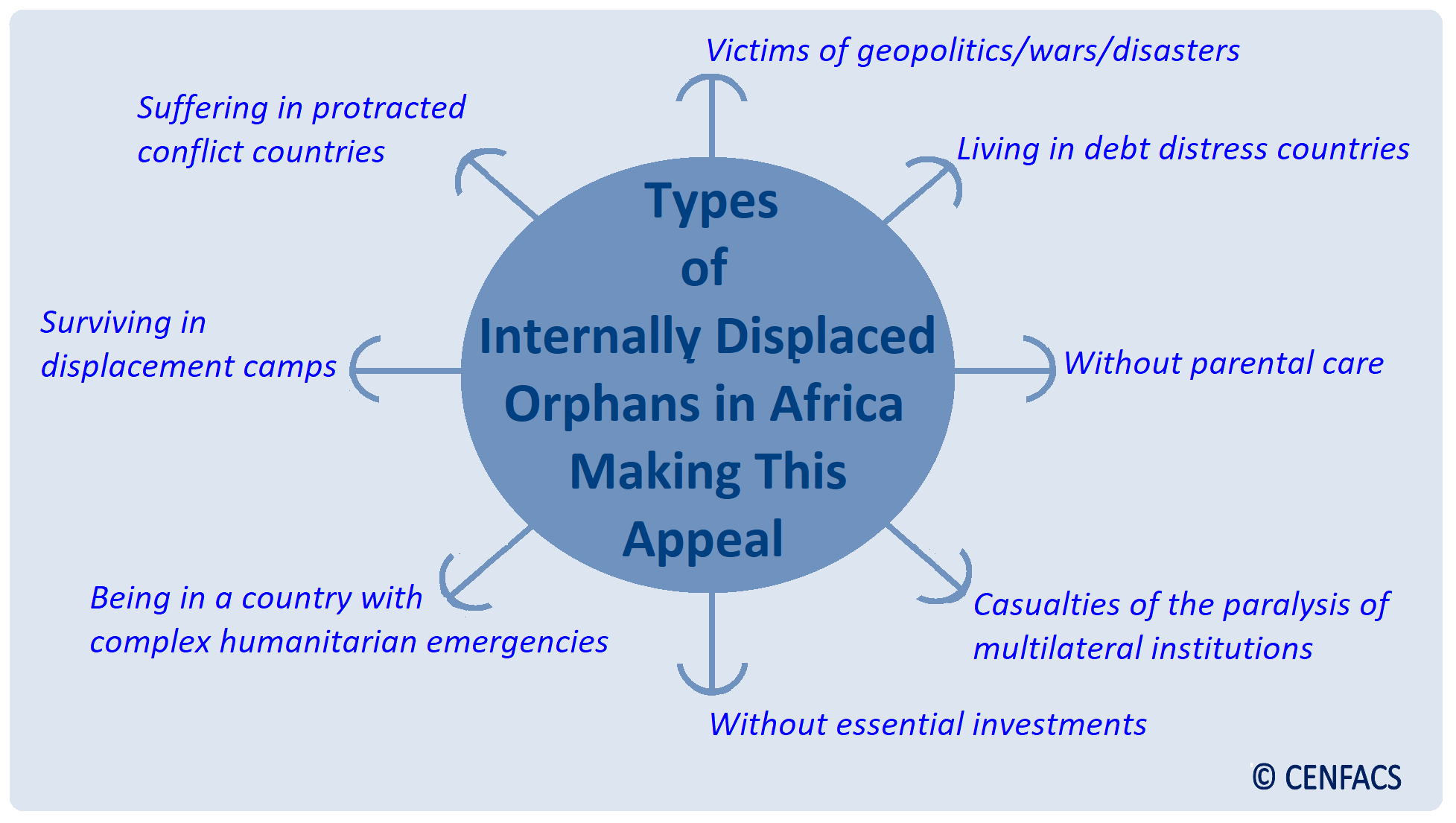Welcome to CENFACS’ Online Diary!
29 January 2025
Post No. 389
The Week’s Contents
• Halving
Povertyfor and with the Internally Displaced Orphans in Africa• Keep and Engage Supporters’ Week (Week Beginning From Monday 27 January 2025)
• Joy of Giving 2025
… And much more!
Key Messages
• Halving Poverty for and with the Internally Displaced Orphans in Africa
This is a standalone appeal, which is about humanitarianly responding to the request of orphaned children in Africa. The appeal is about meeting the goal of reducing the number of orphaned children living in poverty by at least half. Ideally, the appeal would like to lift all of them out of poverty.
Indeed, long periods of armed conflicts, political instability and natural/climate events have led to dramatic situations of children in Africa. If we consider armed conflicts alone without ignoring other events, they have internally displaced many children in Africa. Amongst these children, they are those who lost their parents in these long lasting conflicts (like in the Democratic Republic of Congo). These internally displaced and orphaned children – because of the dramatic impact and legacy of armed conflicts on them – would very much appreciate your assistance. Armed conflicts are taking a heavy toll on them.
• • Who Are These Internally Orphaned Children?
They are
√ aged from 5 to 18 years old and conflict-related internally displaced and orphaned children
√ living in countries affected by protracted conflicts and complex humanitarian emergencies
√ out-of-school children because of the effects of armed conflicts on them
√ the vulnerable, remote and disadvantaged children
√ the victims of growing geopolitical and geo-economic rivalries as well as of the paralysis of multilateral institutions that should have normally helped them
√ surviving in African countries in debt distress
√ those without essential investments on them
etc.
All these children, who are under the age of 18, need support.
Would you mind helping them out?
You can help reduce or halve the number of internally displaced orphaned children in Africa.
Your support will help to enhance social protection of these children, strengthen their economic support and improve their educational outcomes and skills development.
More about this appeal can be found under the Main Development section of this post.
• Keep and Engage Supporters’ Week (Week Beginning From Monday 27 January 2025)
At the beginning of the year, it makes sense to re-communicate and re-engage those who care about our mission and the people we care for. This week, we are looking forward to speak to our supporters, re-engage and keep them for the interest they have in our noble and beautiful cause of poverty reduction.
• • What Is Keep-and-Engage-Supporters Week?
It is about
~ building, developing and maintaining relationships with those who contribute to CENFACS‘ beautiful and noble cause of poverty reduction
~ listening to them and reconnecting with them now and during the year
~ sharing impact stories and our plan for this year
~ and checking donor attrition (that is, lapsed donors compared to the total number of donors/supporters).
• • How Are We Going to Keep and Engage Supporters?
This week, which is sill at the beginning of the year 2025, we are offering supporters the opportunity to have a say and glimpse about the direction of travel our mission will take this year together with them. It is an occasion for them to get involved in what we have as ideas, designs, plans, projects, and programmes. We thought it is better for them to get involved earlier in the year so that they can be part of what we would like to achieve together with them. In this process of early involvement, they can bring in their inputs.
If you are one of our supporters (including volunteers), CENFACS would like to engage and keep you by sharing with you some of the plans and projects we have for this year and the future. We would like to get in touch with you during the Keep-and-Engage-Supporters week, which climaxes with the Joy-of-Giving Days on 30 and 31 January 2025.
• Joy of Giving 2025
To proceed with the Joy of Giving 2025, let us first remind ourselves what it means.
• • Meaning of the Joy of Giving
The Joy of Giving is
~ an appreciation of the happiness of giving something we need to make or we have a need for to another
~ about giving without being wholeheartedly
~ when we do not want something back in return
~ a sacrifice to truly help another.
• • The Joy of Giving 2025
31 January 2025 is the last day of sharing your most impactful and rewarding experiences and feelings of giving. You can share with us your sense of gladness. You can connect and unite with us through your happiness of generosity of helping others.
You can share the good feeling factor you had after giving to causes like the noble and beautiful ones of CENFACS. You can speak to us how delighted you are after giving to charities, the impact of your giving on others, the barriers you overcame in giving, and the inspirations you brought to others in giving.
The Joy-of-Giving Days (30 & 31 January 2025) are also an opportunity to motivate others who may not be aware or do not believe that giving brings a good feeling to the givers or donors or even funders. By sharing your stories of feeling happy after giving, others can find the strengths, power and wisdom to become charity donors or funders. The more donors or funders we have, the better for the noble and beautiful causes of poverty reduction.
To spread your good feeling of giving or tell and share your joy of giving, please contact CENFACS by 31 January 2025.
Extra Messages
• New Year’s Structured Finance Activities or Micro-projects under Financial Capacity and Capability Building Programme or Scheme: Activity 4 (29/01/2025 to 04/02/2025)
• Poverty Reduction Shows in 2025 – In Focus for This Winter: Examples of Poverty Reduction Linked to Consumption, Sustainability and Climate
• CENFACS be.Africa Forum E-discusses the Economic Role of Charities in Africa
• New Year’s Structured Finance Activities or Micro-projects under Financial Capacity and Capability Building Programme or Scheme: Activity 4 (29/01/2025 to 04/02/2025)
We are continuing our programme and scheme to build Financial Capacity and Capability within the community. We are available to work in hybrid mode with users via the Financial Capacity and Capability Building Programme (FCCBP) or Scheme (FCCBS) so that our community members can be stronger this year. Both FCCBP and FCCBS will help beneficiaries to reduce risks linked to financial incapacity and incapability while improving their intergenerational income and transfers.
The fourth activities of FCCBP and FCCBS, which will be run from 29 January to 04 February 2025, have been highlighted below.
• • 29 January to 04 February 2025: Taking Life-saving Financial Decisions (Activity 4 of FCCBP)
Activity 4 of FCCBP is an open discussion with participants on the way they decide their financial matters, whether they do it alone or consult the people around them or ask for financial advice from a financial adviser.
Indeed, life-saving financial decisions are also life-defining financial decisions. Life-defining financial decisions are, according to ‘wiserwomen.org’ (1),
“Decisions you make throughout your lifetime – choosing a career, getting married, having children, buying a home, starting to save and invest – have a big impact on your future financial security, including retirement”.
It means engaging in the financial decision-making process which comprises identification of your financial goals, gathering relevant financial information, analysis of financial data, development of alternative solutions, selection of the best financial strategy, implementation of the selected strategy, impact monitoring and evaluation of the decision.
If any of our users want to participate in this exercise of open and frank discussion on how they take their life-saving financial decisions or how they can improve it, they can contact CENFACS.
• • 29 January to 04 February 2025: Making Financial Decision via Budget (Activity 4 of FCCBS)
In order to make a sound and well-thought decision, one needs some tools to guide them. One of these tools is budget (i.e. a predetermined quantitative plan expressed in financial terms for a given period).
In this Activity 4 of FCCBS, participants will be supported in doing or reviewing their budget to support their financial decisions. They will learn or revisit their budget (e.g., household budget) and how this budget can help them to make better financial decisions.
This exercise will cover budget design, analysis, implementation and impact monitoring and evaluation.
Those who will be interested in developing their financial budget before making their financial decisions, they are free to contact CENFACS.
• Poverty Reduction Shows in 2025 – In Focus for This Winter: Examples of Poverty Reduction Linked to Consumption, Sustainability and Climate
Showing that poverty reduction is happening despite the events like the cost-of-living is another extra message we would like to share with our users, Africa-based Sister Charitable Organisations and other stakeholders. We do it through poverty reduction shows.
• • What Are Poverty Reduction Shows?
Poverty reduction shows are reports that discuss poverty and efforts made to reduce it.
As part of these shows, we would like our local people and Africa-based Sister Charitable Organisations to show or showcase via a variety of evidences, testimonies, cases, films, videos, news and examples of poverty reduction that poverty reduction has happened and continues to happen despite the lingering ill-fated effects of the multiple crises of recent years. For them to show or showcase, they may need to focus on a particular aspect of poverty reduction.
• • In Focus for This Winter: Examples of Poverty Reduction Linked to Consumption, Sustainability and Climate
Our focus for this Winter will be on the examples of poverty reduction in the areas of consumption, sustainability and climate. In other words, participants to the show can provide their examples or experiences how they managed to reduce poverty linked to the lack or insufficient consumption or poverty due to unsustainable development or even climate poverty.
• • Value of Poverty Reduction Shows
Poverty reduction shows can add value to stories of poverty reduction we normally run.
Through this showing exercise, we hope to build a better picture of these poverty reduction cases with features, similarities, differences, patterns and trends for learning and development experience about our system of poverty reduction. It is about proofing and acknowledging that poverty reduction does happen in real life. Because it does happen, we can work with those who are dreaming for poverty reduction so that their dreams become a reality. This finally provides us with the opportunity to reset or change our system of poverty reduction if there is a need to do so.
To show or share your experience on how poverty reduction has happened to you or those you know despite the lingering ill-fated effects of the multiple crises of recent years, please contact and share with CENFACS.
• CENFACS be.Africa Forum E-discusses the Economic Role of Charities in Africa
Like any economic agents, charities in Africa have an economic role to play in African societies. Perhaps, the best way of understanding their role is to explain economic role, then to see how we can fit this definition into our discussion.
• • What Is an Economic Role?
One of the definitions of economic role comes from ‘library.fiveable.me’ (2), which explains that
“Economic roles refer to the various functions and responsibilities individuals or groups have within an economy, which can influence economic productivity, development, and social structure”.
Like any other entities, charities deliver services and some of them produce goods, that help satisfy the needs and wants of their beneficiaries and other people. As such, they contribute in the production, distribution and consumption of goods and services in a society, in the economy.
By giving the example in the UK, the NCVO estimates, quoted by ‘lordslibrary.parliament.uk (3), that
“The voluntary sector contributed £17.8 billion to the UK economy in 2020/2021”.
It said this equated to 0.8% of the total gross domestic product (GDP).
Sheila McKechnie Foundation (4), recognizes that
“Charities – along side other voluntary organisations – founded specifically to address urgent or specific need, gaps in public services, or in response to personal tragedy play a vital role in community balancing three key roles: service delivery, advocacy, and community building”.
Although what we have just argued is happening in the UK, charities in Africa can do the same by contributing the Africa’s GDP and by filling gaps in Africa’s public services.
The economic role of charities can also be approached from the perspective of the donations they can collect from individuals to deliver their services. This collection of donations can be expressed by Charities Aid Foundation’s World Giving Index (5).
For instance, the World Giving Index 2024 provides three measures of generosity (which are helped a stranger, donated money and volunteered time).
According to this index, these countries – Kenya (82%), Nigeria (81%), Liberia (81%), Senegal (78%), Sierra Leone (78%), The Gambia (78%), Malawi (77%) and Niger (77%) – are among the Top 10 most generous countries in the world. High scores of this index can be linked to greater levels of satisfaction and civic participation.
• • What Does the Definition of Economic Role Add to Our E-discussion?
By analysing the above-mentioned definition of economic role and what it has been argued so far about the economic role of charities, it is possible to e-discuss how charities in Africa are meeting their economic role. The e-discussion will also be to explore ways of supporting charities in Africa so that they can increase and improve their economic role and participation since many States in Africa are overwhelmed with the amount of what they can do to reduce poverty and improve the quality of life of their citizens, especially the poorest ones.
African charities can help in a number of ways, such as creation of social wealth, provision of services to people in need, addressing the root causes of poverty, filling gaps in public services, promoting social causes, etc.
Briefly, our discussion will look at the multiplier effect of African charities, that is when they spend money they create opportunities, support the locals and stimulate economic activity in Africa. In other words, we shall discuss the way in which charities in Africa deliver sustainable (i.e., social, economic and environmental) value solutions to poverty and hardships in Africa.
Those who may be interested in this discussion can join our poverty reduction pundits and/or contribute by contacting CENFACS be.Africa Forum, which is a forum for discussion on poverty reduction and sustainable development issues in Africa and which acts on behalf of its members by making proposals or ideas for actions for a better Africa.
To contact CENFACS about this discussion, please use our usual contact information on this website.
Message in French (Message en français)
• FACS, n° 86, Hiver 2024/2025 : Les Associations Caritatives Africaines et leur Action en faveur de la Paix Économique et de la Réduction de la Pauvreté
Les organisations caritatives africaines contribuent dans de nombreux domaines de la vie des personnes dans le besoin en Afrique. La paix est un domaine de contribution de leur travail, en particulier la paix économique, mais pas exclusivement. Leur travail sur la paix économique est le sujet du 86e numéro de FACS.
Le 86e numéro traite de l’économie de la paix, en particulier de la manière dont les organisations caritatives africaines utilisent les principes et les recettes de l’économie de la paix afin de réduire davantage la pauvreté et d’améliorer le développement durable pour les bénéficiaires de leurs projets.
Le 86e numéro, qui arrive au moment opportun lorsque nous traitons des cadeaux festifs de la paix, s’inspire des théories de la paix économique et de la façon dont elles peuvent être appliquées aux milieux et au contexte des secteurs caritatif et bénévole.
Le numéro 86 fait également référence à l’indice mondial de la paix développé par l’Institut pour l’Économie et la Paix (IEP). Selon l’IEP (6),
« L’Afrique subsaharienne a enregistré une baisse de la tranquillité dans l’indice mondial de la paix 2024, le score moyen dans la région s’étant détérioré de 0,89 % au cours de l’année écoulée. L’Afrique subsaharienne est l’avant-dernière région pacifique derrière le Moyen-Orient et l’Afrique du Nord, avec trois des dix pays les moins pacifiques du monde ».
En référence à l’argument de l’IEP, le numéro 86 se penche sur l’écosystème de l’économie de la paix et sur la manière dont les organisations caritatives africaines tentent de résoudre les problèmes auxquels leurs bénéficiaires sont confrontés pendant les périodes de reconstruction avant et après la crise. Cela inclut le travail de prévention et de résilience qu’elles entreprennent afin que leurs bénéficiaires puissent construire une paix plus forte, juste et durable.
La copie intégrale du 86e numéro de la FACS est disponible sur demande.
Pour toute question ou commentaire à ce sujet, n’hésitez pas à contacter le CENFACS.
Main Development
• Halving Poverty for and with the Internally Displaced Orphans in Africa
This appeal includes two items:
a) Appeal summaries
b) How to donate.
• • Appeal Summaries
The following summarises the data, needs, request, expectations, use, beneficiaries and outcomes that briefly make the case for halving poverty for and with the internally displaced orphaned children in Africa.
• • • The data
There are some difficulties in obtaining the exact number of children who become orphans in Africa because of wars, armed conflicts and displacement. Despite these difficulties, many organisations and experts working on this issue in Africa and local sources argue that this number is huge. Our Africa-based Sister Charitable Organisations working on the grounds confirmed this huge number of these children, knowing the conditions and circumstances of many families or communities they are dealing with. What is this number?
• • • • Estimated number of orphaned children because of wars and armed conflicts in Africa
Different organisations working on orphaned children matter provide their numbers in terms of internal displacement.
For instance, the United Nations Children’s Fund (7) argues that
“At the end of 2023…, large numbers of refugee children… originated from Sudan (790,000), the Democratic Republic of Congo (510,000), the Central African Republic (400,000) and Somalia (400,000)” (p. 7)
The same United Nations Children’s Fund adds that
“Displacements due to conflict and violence typically last far longer than those caused by disasters due to the often protracted nature of conflict” (p. 8)
Similarly, the website ‘borgenproject.org’ (8) states that
“In the entire continent of Africa, there are an estimated 52 million orphans. Statistics for orphans combine three groups including those that have lost both parents, those that have lost a father and those that have lost a mother”.
Although the number of 52 million orphans dates in 2020, it is still relevant today knowing the ongoing armed conflicts and polycrises in Africa, in places like the Eastern regions of the Democratic Republic of Congo. This number still counts since no one knows exactly how many of these 52 million orphans have received life-saving help.
Taking the same line of argument, the report from the Geneva-based Internal Displacement Monitoring Centre, quoted by ‘voanews.com’ (9), explains that
“Almost 93 percent are displaced due to conflict and violence, and 26 million of them are displaced in just five countries: the Democratic Republic of Congo, Ethiopia, Nigeria, Somalia and Sudan”.
In most of these displacement cases, children tend to get separated from their parents or families. This situation often leads to orphanage for them. As the website ‘africarelief.org’ (10) puts it,
“Armed conflicts, civil wars, and political instability have displaced millions of families across Africa, leaving children orphaned and destitute”.
A report released by the African Committee of Experts on the Rights and Welfare of the Child (11) notices the same by stating that
“New report shows an estimated 35 million children in Africa are without parental care”.
These children face numerous challenges including lack of access to education, healthcare and basic necessities. Their needs of education, healthcare and other ones can be met if they get relevant support.
• • • The Needs
The needs for emergency life-saving support are 24 times more than average in Africa where the livelihoods of displaced orphaned children are severely affected. These children need your life-saving and humanitarian help to meet their life-surviving need.
• • • The Ask
What it has been asked to you is your influence or power to have a positive effect on those who are holding the keys to solutions regarding the problems these internally displaced orphaned children are facing, especially for problems that are man-made like armed conflicts.
Alternatively, you can donate money to support these children.
Your gift of Positive Influence or Money or both will provide an emergency life-saving and enhancing relief to the Internally Displaced and Orphaned Children in Africa.
• • • The Use of Your Support
Your support will help provide useful in-kind donations like
√ food
√ furniture and bedding
√ clothing and hygiene
√ books and educational materials
√ educational games and activities
√ computer items
√ art therapy
√ digital items
etc.
Briefly, your support will improve the lives, well-being and prospects of these children.
• • • The Expectations from Your Gift
It is expected that your gift of Positive Influence or Money will help to address the plight of the internally displaced orphaned children in Africa as follows:
√ to address the problem of the internally displaced orphaned children, which sometimes get undervalued
√ to avoid sexual abuse of these children, forced labour, trafficking, substance and drug abuse, mental health issues
√ to incentivize parents to look for their children separated from them because of armed conflicts
√ to enhance social protection of these children
√ to halve the number of the internally displaced orphaned children living in poverty
√ In brief, to reduce or end deprivations linked to the lack of access to basic services, violence, abuse, neglect, exploitation and other vulnerabilities.
• • • The Beneficiaries of your Gift of Positive Influence or Money Donation
They include children who are…
√ internally displaced and orphaned because disaster-related and conflict-driven causes
√ orphans because of economic hardships, natural disasters and other social factors
√ orphans and conflict-related internal displaced children
√ living in countries affected by protracted conflicts and complex humanitarian emergencies that are orphaning children
√ out-of-school because of the effects of armed conflicts on them
√ the vulnerable, remote and disadvantaged ones
√ the victims of growing geopolitical rivalries and the paralysis of multilateral institutions that should have normally helped them
√ living in African countries in debt distress
√ those without essential investments
√ orphans in displacement camps
etc.
In short, the beneficiaries will be children in orphaning situations.
• • • The Outcomes
With the influencing support or money donated, the following changes will be expected:
√ Reduction in the number of the internally displaced orphaned children
√ Cut in numbers of the internally displaced orphaned children
√ Better food supplements for children’s well-being, welfare and wellness
√ Reduction of malnutrition for these children
√ Increase in the number of the internally displaced orphaned children returning to education
√ Rise in the number of rescued children from orphanage
√ More and better access to adaptation to new life for the internally displaced orphaned children
√ More happy and healthy orphaned children in Africa
Etc.
• • How to donate
You can donate either influence or money or both.
• • • Donating influence
To donate, please contact influential persons (or those having the keys) to reduce or solve the detrimental effects of the crises that the African internally displaced and orphaned children are suffering from and make these persons reduce or end these negative effects on them.
You can as well influence the things or factors that determine child orphanage in order to create lasting favourable healthy and living conditions for these internally displaced and orphaned children.
To move forward your influence, you can provide faster and smarter influencing support for the internally displaced and orphaned children. You can use digital assistant or Artificial Intelligence (AI) chatbot or co-pilot to plan and execute your timely influencing support. This will help save the internally displaced and orphaned lives, reduce costs and speed up your life-saving response to them.
Please let CENFACS know about your influencing work or contribution you are or will be making and its outcome on behalf of the internally displaced and orphaned children in Africa.
To let us know, you can contact CENFACS as follows:
*over phone
*via email
*through text
*by filling the contact form on this site.
On receipt of your message or influencing donation, CENFACS will contact you for record and thank you for any influencing donation made. However, should you wish your influencing support to remain anonymous; we will respect your wish.
• • • Donating money
You can donate money, pledge and make a gift declaration to support.
• • • • Making a Money Donation
You can make a donation of £5 or more to support the Internally Displaced and Orphaned Children in Africa (IDOCA).
• • • • Making a Pledge
You can make a pledge of £5 or any amount more than £5 to support IDOCA.
• • • • Making a Gift Aid Declaration
You can make a gift aid declaration to support IDOCA.
All donations, pledges and gift aid declarations MUST be made payable to CENFACS (the Centre for Francophone African Development).
To avoid fundraising frauds and scams, CENFACS would like to ask to all potential money funders and donors to contact us prior to making any donations, pledges and gift aid declarations.
• • • • How to Donate Money
You can donate
*Over phone
*Via email
*Through text
*By filling the contact form on this site.
IDOCA will be very grateful if you could donate to their noble cause of poverty reduction. Your support will halve the number of IDOCA who do not have a healthy and happy life.
Please DONATE, PLEDGE AND MAKE A GIFT AID DECLARATION of £5 or any amount more than £5 as a way of supporting this project. CENFACS will enthusiastically accept, on behalf of the beneficiaries, your given support.
CENFACS welcomes any enquiries and or queries about this humanitarian relief appeal.
Please do not wait to donate as the needs are NOW pressing and urgent.
We look forward to your support to make helpful difference to those internally displaced and orphaned children in pressing needs of survival and of coping with life.
Thank you for your generosity.
Thank you in anticipation for your willingness to give your Positive Influence or Money and help save the lives of the internally displaced and orphaned children in Africa.
_________
• References
(1) https://wiserwomen.org/wp-content/uploads/2018/01/seven-decisions-english (accessed in January 2024)
(2) https://library.fiveable.me/key-terms/ap-hug/economic-roles (accessed in January 2025)
(3) https://lordslibrary.parliament.uk/voluntary-and-community-sector-contribution-to-society/ (accessed in January 2025)
(4) https://smk.org.uk/essays/charities-economic-value-is-huge-but-their-true-value-runs-far-deeper/# (accessed in January 2025)
(5) https://www.cafonline.org/docs/default-source/inside-giving/wgi/wgi_2024_report.pdf (accessed in January 2025)
(6) Institute for Economics and Peace. Global Peace Index 2024. Measuring Peace in a Complex World, Sydney, June 2024. Available from: http://visionhumanity.org/resources (accessed in January 2025)
(7) United Nations Children’s Fund (2024), International Data Alliance for Children on the Move, 9 Facts about Children on the Move: 2024 update, New York
(8) https://borgenproject.org/10-facts-orphans-in-africa/# (accessed in January 2025)
(9) https://www.voanews.com/a/africa-displacement-triples-fueled-by-conflict-violence-and-disasters-new-report-states/7877504.html (accessed in January 2025)
(10) https://africarelief.org/blogs/orphans-in-africa (accessed in January 2025)
(11) https://www.sos-childrensvillages.org/news/new-report-shows-an-estimated-35-million-children (accessed in January 2025)
_________
• Help CENFACS Keep the Poverty Relief Work Going This Year
We do our work on a very small budget and on a voluntary basis. Making a donation will show us you value our work and support CENFACS’ work, which is currently offered as a free service.
One could also consider a recurring donation to CENFACS in the future.
Additionally, we would like to inform you that planned gifting is always an option for giving at CENFACS. Likewise, CENFACS accepts matching gifts from companies running a gift-matching programme.
Donate to support CENFACS!
FOR ONLY £1, YOU CAN SUPPORT CENFACS AND CENFACS’ NOBLE AND BEAUTIFUL CAUSES OF POVERTY REDUCTION.
JUST GO TO: Support Causes – (cenfacs.org.uk)
Thank you for visiting CENFACS website and reading this post.
Thank you as well to those who made or make comments about our weekly posts.
We look forward to receiving your regular visits and continuing support until the end of 2025 and beyond.
With many thanks.
